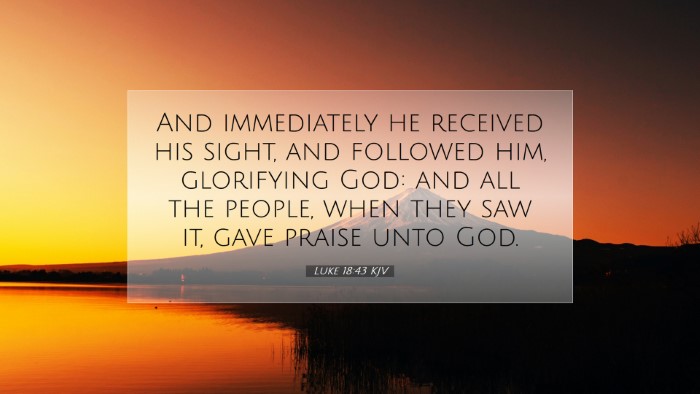Commentary on Luke 18:43
Text: "And immediately he received his sight, and followed him, glorifying God: and all the people, when they saw it, gave praise unto God." (Luke 18:43, KJV)
Introduction
Luke 18:43 presents a vivid moment of miraculous healing and transformation, encapsulating themes of faith, gratitude, and the public acknowledgment of God's power. This verse concludes the account of the healing of a blind man near Jericho, illustrating profound spiritual insights applicable to believers and scholars alike.
Summary of the Commentary
- Miraculous Healing: The immediate restoration of sight serves as a testament to Jesus' divine authority and compassion. Commentators like Matthew Henry emphasize that this miracle is not merely a physical restoration but signifies spiritual awakening.
- The Response of the Healed: The healed man’s decision to follow Jesus demonstrates a vital aspect of discipleship. Albert Barnes notes that true faith is marked not just by individual healing but by a commitment to follow Christ actively.
- Public Praise: The reaction of the crowd, who collectively glorify God, emphasizes the role of community in recognizing and affirming acts of divine intervention. Adam Clarke highlights that public acknowledgment fosters a culture of thanksgiving and worship, encouraging others to reflect on God’s goodness.
Detailed Analysis
Miraculous Healing
In this narrative, the blind man's faith in Jesus precedes his physical cure. According to Matthew Henry, the healing is instantaneous, illustrating the holistic nature of Christ's miracles—which restore not only physical sight but provides spiritual enlightenment. The immediacy with which the blind man received his sight suggests that divine grace is readily available to those who earnestly seek it.
The Role of Faith
The act of calling upon Jesus is central to this passage. Albert Barnes suggests that the blind man’s desperate pleas were a manifestation of his faith. This interaction highlights the principle that faith plays a critical role in receiving God’s grace. The significance of faith transcends the physical realm, ushering in spiritual insights that encourage believers to trust in Jesus for their needs.
Following Jesus
Post-healing, the blind man's choice to follow Jesus signifies a profound commitment to discipleship. Matthew Henry draws attention to the idea that true healing involves not only receiving physical benefits but also a commitment to live in accordance with God’s will. By glorifying God, the man demonstrates an understanding that his healing is not an end in itself but a means to worship and serve the divine purpose.
The Symbolic Nature of Sight
The restoration of sight serves as a metaphor for spiritual awakening. Adam Clarke posits that the physical healing exemplifies deeper truths concerning spiritual blindness and enlightenment. This symbolizes the transition from darkness to light, which is a recurring theme in the Gospels. The healed man’s glorification of God further signifies the importance of recognizing God’s hand in personal transformation.
Reflection on the Community Response
The communal response to the miracle showcases a collective faith experience. All the people rejoiced and glorified God, indicating that miracles can serve to strengthen communal faith and encourage collective worship. Albert Barnes remarks on the significance of public testimony in the life of the faith community, suggesting that such moments are vital for shared spirituality and devotion.
Applications for Today
- Faith in Action: Believers are called to demonstrate their faith actively, reflecting a commitment to follow Jesus and glorify God in their lives.
- Community and Worship: The passage encourages contemporary faith communities to celebrate God’s work together, fostering a culture of praise that acknowledges divine intervention.
- Awareness of Spiritual Needs: Just as physical blindness is healed, congregants are encouraged to seek spiritual clarity, being aware of their own spiritual blindness and needing Jesus’ healing touch.
Conclusion
Luke 18:43 encapsulates the essence of Jesus’ ministry—bringing healing, fostering discipleship, and prompting communal worship. The insights drawn from Matthew Henry, Albert Barnes, and Adam Clarke allow pastors, students, theologians, and Bible scholars to engage deeply with the text, encouraging a holistic understanding of faith as both a personal journey and a communal experience. This passage serves as a reminder that every act of divine grace is worthy of praise and can lead to both individual transformation and collective celebration.


